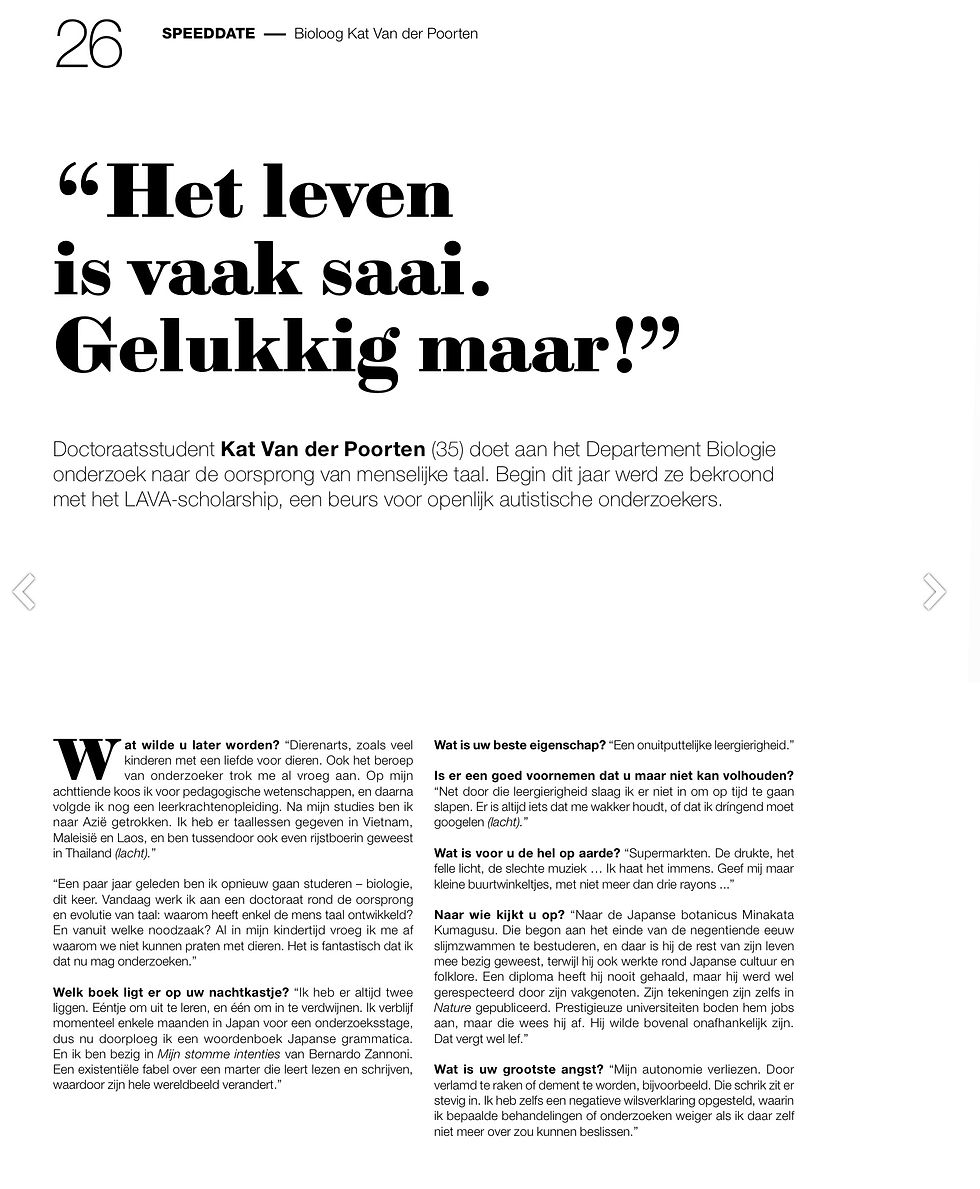Looking back at Philosophical Perspectives on NeuroDiversity
- 30 sep 2020
- 3 minuten om te lezen
The fifth Antwerp study day of the Autism Ethics Network scheduled on the 16th of March 2020 had to be postponed because of Covid. We didn’t despair but took the initiative to organize our first virtual study day. Thanks to our presenters, our co-organizers and, mainly, our audience this was a success. People enjoyed the low-trigger on-line environment set managed by Els Van Beneden from LAVA and thanks to the NeuroEpigenEthics team all talks are available as recordings on their YouTube channel (for links, see below).
But, obviously, the most important were the presentations, fully focused on Philosophical Perspectives on NeuroDiversity. All three talks did in fact take neurodiversity as their starting position to creatively develop philosophical perspectives maybe unthinkable without this concept. In hindsight it might have been more appropriate to use as title: Philosophical Perspectives fromNeuroDiversity .
Below is a short recap of the subjects covered in these three talks. For those who attended live, it is a way to thank them by sharing most of the material used and referred to by the speakers. For those who could not attend it live, it is a way to allow them to enjoy the recordings on their own speed but still with a little bit of added context.
All links to recordings and materials are linked in the text below the fold. It is a straightforward way to reconstruct the meeting so do distribute widely to make neurodiversity-inspired philosophy as accessible as possible.
First, and least, I presented an introduction providing context on the Autism Ethics Network and its activities as well as background on the co-organizers LAVA and NeuroEpigenEthics. It starts with our ground rules for ‘minimum trigger’ virtual conferences. The slides can be accessed here. A recording of the presentation can be found here.
Our first speaker – Janna Van Grunsven – invited us to “Re-think ‘deficiency’ with 4E cognition”. She reviewed the various ways enactive philosophy had attempted to deal with atypical autistic embodiment. She showed that, even if all these approaches belonged to the same broad framework, some subtle differences in their starting points led to very different compatibilities with an ethical approach to neurodiversity. Her conclusion was that only via the ‘scaffolding’ approach we could definitively avoid the ‘deficiency’ approach the key proponent of neurodiversity: autism. The link to her presentation is here. The recording of her talk can be seen here.
The second speaker – Robert Chapman – responded to challenges from some scientists that the concept of neurodiversity did not hold scientific value. In his presentation entitled “Neurodiversity, Objectivity, Relativism”, he talked about the alternatives in which neurodiversity and scientific objectivity are possibly combined in productive ways. He explained why he preferred the ‘ecological framework’ where neurodiversity could do the work done by the concept of biodiversity in recent ecological frameworks. On such approach autistic difference can be positively valued as contributing to solutions that address new challenges posed by an ever evolving environment. His slides can be found here. The recording of his talk can be accessed here.
Finally, Jo Bervoets – who is writing this recap – took the floor talking about “Neurogradualism: neurodiversity without categorical difference”. He tried to reconcile the neuroscientific, explanatory, focus on autism with one that primarily tries to understand the diversity of autistic lived experience. His proposal passed via decoupling autism from dysfunction. In speaking of an autism related disorder one could at the same time view autism as one way in which people can perceive the world and keep the link with many issues autistic people face in the present world (and for which we need support in many cases). In this way explanations were at the service of understanding, i.e. of bringing diverse people closer together. You can download his slides here. A recording of his talk is here.
Feel free to ask questions to the presenters in the comments of the YouTube recordings or – for Robert and myself – on Twitter.
One of our participants asked whether we thought Neurodiversity was ever going to be accepted broadly within our societies. The poll showed we were all very optimistic about this. We hope this event has contributes to such an evolution and we humbly ask you to ‘spread the word’. If you do spread the word, use the hashtag #PhPeNeuroDiversity for added effect.
If this makes you feel you missed something then do not miss next Autism Ethics Network events! Follow the events page (or this blog) for updates.




Opmerkingen